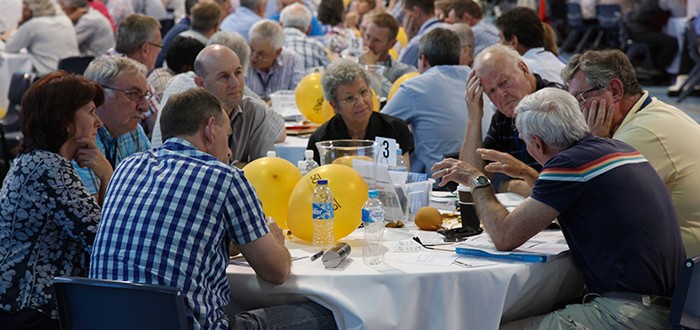Not business as usual
It was about half an hour into the session before I realised something in the room had changed.
Four hundred people can’t help but be noisy. Even when they are attempting to be as quiet as possible. But as I left our busy media table to walk from the front of the room to the back, I started to feel the difference.
It was the constant low, intent buzz of voices. Frequent, quiet laughter. The concentration on delegates’ faces as they leaned across or around the circular tables to better hear speakers. Smiles. Hand gestures. Were my eyes and ears deceiving me?
I quickly walked back to the media desk. ‘Stop. Look,listen’, I whispered to my team members. At first they didn’t get it either. Then I saw realisation dawn on their faces too. This was a long way from ‘normal’ synod behaviour, from ‘business as usual’ we were so used to observing. If anything, it more closely resembled a long lunch break or perhaps a time of worship.
Chaplain of the day, Assistant Bishop of New Zealand John Davison, was walking the room too. I asked him how he would describe the mood.
‘Harmonious’, was his first thought. ‘Peaceful. I’ve had people approach me today, but it hasn’t been about this [first dialogue session]. I would have expected more, that people would be more troubled but it hasn’t been the case.’
Back at the media desk, Ordination Dialogue Group (ODG) co-chair Pastor James Haak was smiling as he spoke to us. ‘We’ve done about five dialogues now and this part is always the same’, he said.
‘First, delegates pair up and each gets to tell their own personal story of their journey with this question [of whether women may be ordained to the office of public ministry]. Then they share their partner’s story with the rest of the people at their table.
‘This section is so empowering. To be able to share their story and then tell the story of someone else whom they may not agree with, but have been asked to listen to and to understand, means that delegates can no longer view the other as the enemy. Instead they come to see them as a brother or a sister in Christ.’
He warned us that this harmonious mood may not last. That as delegates move from telling their own stories into exploring the story of the church and exploring God’s story [dialogue session two], there is potential for conflict and division to worm their way into the room again. That, as we later transition from dialogue back to debate, that battle lines will be drawn once more.
But, as delegates gather again in the light of the Christ Candle we pray once more that the Holy Spirit will be in this place, where 422 delegates gather in synod to consider this question, in his name.
by Rosie Schefe (editor of The Lutheran)


Where Gods love comes to life through Jesus !
Thanks Rosie. Most reassuring. Praying is happening outside as well.